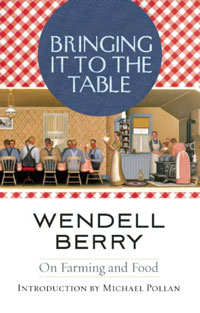 Counterpoint, $14.95
Counterpoint, $14.95
written byWendell Berry
review by Alex Mulcahy
Wendell Berry understands technology’s lure to farmers. In 1950, when he was 16, his father bought a tractor, and suddenly he found he was impatient with his mules. But what does a tireless machine do to a farmer’s relationship to the land? Land becomes something to overcome—a perspective shared by a traveler on an interstate or in a plane. “I now suspect that if we work with machines,” Berry writes, “the world will seem to us a machine, but if we work with living creatures, the world will appear to us a living creature.”
Throughout his four-decade-plus career as a writer, Berry has been sounding the alarm on sustainability—long before the term was common—and his influence is difficult to underestimate. In his introduction to this collection of Berry essays, Michael Pollan challenges his readers to find a single insight that belongs solely to him and can’t be found in Berry’s writing. But the big difference between the two is perspective. Pollan, the urbane journalist with an insatiable curiosity, is a consumer advocate, talking to eaters about obesity, processed food and marketing in our modern food system. Berry, a lifelong farmer, stays focused on the problems the Green Revolution has produced for farming, including the degradation of our soil and the destruction of farming communities.
The book’s first two parts—“Farming” and “Farmers”—tackle the big picture and highlight several ingenious and passionate farmers who thrive while opting out of big agribusiness. The third section, “Food,” features excerpts from Berry’s fiction and revolves around meals. Why? Because food you can eat by yourself, but meals require community.

